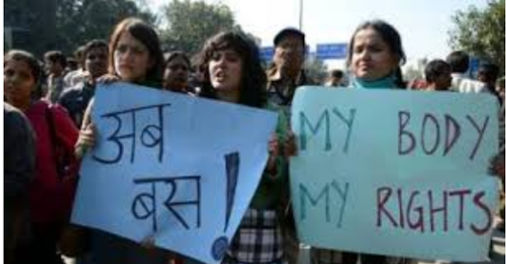INTRODUCTION
The Indian government has made its stance clear on marital rape, stating that classifying it as “rape” would be “excessively harsh and therefore, disproportionate” within the context of marriage. This decision acknowledges that husbands don’t have the fundamental right to disregard their wives’ consent, yet emphasizes the complexities marriage brings to the table, distinguishing non-consensual sex within marriage from similar acts outside it.
The government’s affidavit to the Supreme Court highlighted that marital rape should be illegal and criminalized. Still, it stressed that the consequences of such violations within marriage differ from those outside it. Existing laws, such as the Protection of Women from Domestic Violence Act and sections 354, 354A, 354B, and 498A of the Indian Penal Code, already protect wives’ consent within marriage.
CENTRE’S ARGUMENT
The Centre’s affidavit acknowledged that non-consensual acts within marriage, including forced sex, already attract penal consequences under the Domestic Violence Act (DVA) and other provisions of the penal code. However, it argued that labeling such acts as ‘rape’ could destabilize the ‘delicate balance’ of marital relationships and lead to significant disturbances within the institution of marriage.
While maintaining that a woman’s consent is equally valid inside and outside marriage, the government contended that marital relationships introduce additional complexities that require different legal treatment. “This Hon’ble Court has further adopted a balancing approach to reconcile the perceivable engagement between fundamental rights,” the affidavit stated.
In addition, the Centre invoked Article 14 of the Constitution, which guarantees the right to equality, to argue that sexual violations in marital and non-marital spaces are distinct situations that warrant separate legal treatment.
“To declare that Section 375/376 of IPC apply to the institution of marriage would result in unsettling the delicate balance and sensitivity of the issue at hand,” the Centre argued.

CRITICISM AND CONCERNS
Women’s rights organizations and activists have criticized the Centre’s decision, labeling it as regressive and insensitive. They argue that marital rape is a distinct and serious issue requiring specific legislation.
“Centre’s stance is regressive and ignores women’s experiences. Existing laws are insufficient to address marital rape.” – Dr. Ranjana Kumari, Women’s Rights Activist
“Criminalization is essential to deter perpetrators and provide justice to survivors.” – Advocate Aparna Bhat
Key Concerns include:
- Lack of clarity: Existing laws do not explicitly define or address Spousal rape.
- Inadequate protection: Current provisions fail to provide sufficient safeguards for women.
- The limited scope of Section 498A
- Social stigma: Sexual violence within marriage remains largely unreported due to societal norms.
DEBATE OVER MARITAL RAPE LEGISLATION
The two-judge bench of the Delhi High Court delivered a split verdict in 2022, with Justice Rajiv Shakdher in favor of striking down the intimate partner rape exception. He lamented the absence of direct government participation in the arguments, stating that the “arguments would have been richer had Mehta, ie, learned Solicitor General, assisted the court in the matter.”
In its 49-page affidavit, the Centre stated that while marital rape “ought to be illegal and criminalized”, it refrained from endorsing the term ‘rape’ for such violations within marriage.
The government contended that the consequences of non-consensual acts within a marriage differ from those outside it and cited existing legal provisions to protect the wife’s consent within marriage, including Sections 354, 354A, 354B, and 498A of the Indian Penal Code (IPC) and the Protection of Women from Domestic Violence Act, 2005.
INTERNATIONAL PERSPECTIVE
The United Nations emphasizes the importance of criminalizing marital rape, considering it a form of violence against women. Countries like the United States, United Kingdom, Australia, Canada, Germany, France, Sweden, Denmark, and Norway have already criminalized and recognized it as a serious crime, often with specific laws and penalties.
India has ratified international conventions and treaties, including the Convention on the Elimination of All Forms of Discrimination against Women (CEDAW) and the Universal Declaration of Human Rights (UDHR). These agreements emphasize equality, dignity, and freedom from violence for all individuals, including women.
The UN has recommended that India criminalize marital rape, strengthen laws and policies to protect women, ensure effective implementation, and provide support services for survivors.
India’s failure to criminalize marital rape has drawn criticism from the UN Special Rapporteur on Violence against Women, Human Rights Watch, Amnesty International, and international women’s rights organizations.
IMPLICATIONS AND CONSEQUENCES
The Centre’s resistance to Criminalizing marital rape has severe social implications. It normalizes domestic violence against women, perpetuates patriarchal norms, and increases women’s vulnerability to abuse. This stance also undermines women’s autonomy, dignity, and right to consent, reinforcing harmful gender stereotypes.
The decision also has significant legal and psychological consequences. It denies survivors legal recourse and justice, fails to provide adequate protection, and conflicts with international human rights standards. Marital rape can lead to trauma, stress, physical harm, and long-term emotional damage. Survivors may experience PTSD, depression, anxiety, and reproductive health issues.
The economic and human rights implications are equally alarming. It violates women’s fundamental human rights, perpetuates gender-based discrimination, and damages India’s global reputation. Criminalizing marital rape is crucial to protect women’s rights, dignity, and well-being, and to align India with international human rights standards.
CONCLUSION
The Centre’s decision to resist criminalizing marital rape, citing existing laws as adequate, has sparked intense debate and criticism. While the government argues that existing provisions suffice, experts and activists contend that marital rape requires specific legislation to address its unique dynamics. The current stance perpetuates a culture of impunity, undermining women’s rights and dignity.
India’s failure to criminalize marital rape contravenes international human rights standards and best practices. The government must reconsider its stance, acknowledging the devastating consequences of spousal rape on survivors. Comprehensive legislation awareness and sensitization are essential to combat this pervasive issue.
Ultimately, criminalizing marital rape is not only a legal imperative but a moral obligation to protect women’s autonomy, dignity, and well-being. The Centre must prioritize women’s rights and safety, aligning India with global standards of justice and equality.
Call to Action: The public, civil society, and policymakers must continue advocating for marital rape legislation, ensuring a safer, more just society for all women.
-SHEELU KUMARI
MUST READ: Legacy of Steel: How Ratan Tata’s Vision Reshaped India’s Corporate Landscape


